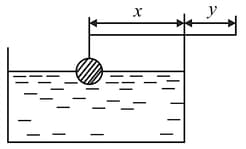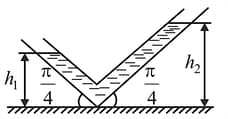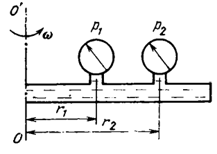S S Krotov Solutions for Chapter: Mechanics, Exercise 1: Exercise
S S Krotov Physics Solutions for Exercise - S S Krotov Solutions for Chapter: Mechanics, Exercise 1: Exercise
Attempt the practice questions on Chapter 1: Mechanics, Exercise 1: Exercise with hints and solutions to strengthen your understanding. Science for Everyone Aptitude test problems in Physics solutions are prepared by Experienced Embibe Experts.
Questions from S S Krotov Solutions for Chapter: Mechanics, Exercise 1: Exercise with Hints & Solutions
A piece of ice floats in a vessel with water above which a layer of a lighter oil is poured.
How will the level of the interface change after the whole of ice melts? What will be the change in the total level of liquid in the vessel?
A homogeneous aluminium ball of radius is suspended on a weightless thread from an end of a homogeneous rod of mass . The rod is placed on the edge of a tumbler with water so that half of the ball is submerged in water when
the system is in equilibrium (Fig.). The densities and of aluminium and water are and respectively.
Determine the ratio of the parts of the rod to the brim, neglecting the surface tension on the boundaries between the ball and water.

To what division will mercury fill the tube of a freely falling barometer of length at an atmospheric pressure of ?
A simple accelerometer (an instrument for measuring acceleration) can be made in the form of a tube filled with a liquid and bent as shown in Fig. During motion, the level of the liquid in the left arm will be at a height , and in the right arm at a height .
Determine the acceleration of a carriage in which the accelerometer is installed, assuming that the diameter of the tube is much smaller than and .

A jet plane having a cabin of length flies along the horizontal with an acceleration . The air density in the cabin is .
What is the difference between the atmospheric pressure and the air pressure exerted on the ears of the passengers sitting in the front, middle, and rear parts of the cabin?
A tube filled with water and closed at both ends uniformly rotates in a horizontal plane about the -axis. The manometers fixed in the tube wall at distances and from the rotational axis indicate pressures and respectively (Fig).

Determine the angular velocity of rotation of the tube, assuming that the density of water is known.
Let us suppose that the drag to the motion of a body in some medium depends on the velocity of the body as , where .
At what values of the exponent will the body pass an infinitely large distance after an initial momentum has been imparted to it?
The atmospheric pressure on Mars is known to be equal to of the atmospheric pressure on the Earth. The diameter of Mars is approximately equal to half the Earth's diameter, and the densities and of the planets are and .
Determine the ratio of the masses of the Martian and the Earth's atmospheres.
